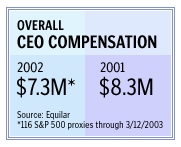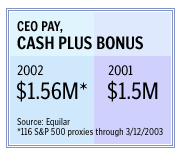NEW YORK (CNN/Money) -
Upset with his performance this season, Bob Knight, the basketball coach at Texas Tech, gave up his $250,000 annual salary.
These days, few corporate executives are doing the same despite a stretch of falling profits, rising job cuts and sinking stock prices. But a small dose of sobriety has emerged as companies reveal how they compensated their top executives last year.
After enjoying a $17 million bonus in 2001, Sandy Weill, chief executive of Citigroup Inc. (C: Research, Estimates), took no bonus last year, when company shares fell 30.3 percent. The CEO of Eli Lilly (LLY: Research, Estimates), Sydney Taurel, earned a symbolic $1 salary in 2002 and was given options to buy 350,000 Lilly shares if they rise some 29 percent.
Taurel joins Larry Ellison, the CEO of Oracle (ORCL: Research, Estimates), who took stock options but no salary and bonus last year.

Median executive compensation fell by 10.1 percent last year to $7.3 million, according to Equilar, which analyzed 161 proxies from Standard & Poor's 500 companies submitted to the Securities and Exchange Commission as of last week.

But the figures from Equilar, a compensation research firm, also showed that median salaries plus bonus actually rose 3.7 percent to $1.56 million in 2002, after subtracting the value of stock option and restricted stock grants.
"That surprised me a lot," said Brian Foley, who runs Foley & Co, a compensation advisory firm. "You would have thought the guys at the top would have tightened their belts a little bit."
Another survey concurred. The highest-paid U.S. executives received a 5.9 percent increase in total cash compensation last year, according to the Executive Compensation Index. The figures, from the Economic Research Institute, found that executive compensation grew faster than annual company revenue, which rose 0.89 percent in 2002.
Some executives, of course, got big raises. James Cayne, who runs Bear Stearns, was awarded a package worth $19.64 million last year, when Bear Stearns (BSC: Research, Estimates) stock far outperformed its rivals by rising 1.2 percent.
Sears Roebuck and Co. (S: Research, Estimates) nearly tripled the 2002 bonus of CEO Alan Lacy to $1.8 million during a year when Sears stock fell 49 percent.
| Related Stories
|

|
|
|
|
Thanks mostly to stock options, the CEO of money-losing Delta Airlines (DAL: Research, Estimates), Leo Mullin, saw his pay package more than double last year to about $13 million.
"Corporate America has not signaled that they are not going to pay themselves," said Alan Johnson, president of Johnson Associates, a compensation consulting firm.
No more loans
Congress imposed one form of belt tightening. The Sarbanes-Oxley Act, born from accounting fraud at Enron, WorldCom and elsewhere, bans most company loans to executives. Some of these "loans" turned out to be giveaways, forgiven by companies including now-bankrupt WorldCom.
Another area of change may involve stock options. The compensation, which allows for the purchase of stock at a pre-set price at a future date, has come under fire from critics who contend options provide a motive to inflate profits.
While Equilar figures show that options account for more than two thirds of the average executive compensation package, a third year of sinking stock prices has pushed many of these perks "underwater."
That may explain why salary and bonuses as a percentage of total compensation rose to 23.2 percent last year from 20.2 percent in 2001, Equilar figures show.
"This is mainly driven by the drop in the value of stock option grants," said Tim Ranzetta, an Equilar analyst.
The Financial Accounting Standards Board took a step this month to require that companies treat stock options as an expense. Merrill Lynch has estimated that expensing stock options could cut profits by 10 percent, leading companies to other forms of compensation.
Progressive Corp., an insurer, made such a move, scrapping stock option awards for restricted stock.
Progressive spokesman Thomas King said the switch to restricted stock, which can be sold only after a specified period, will more closely align management with investors.
"If our managers have stock, they get exactly the same payout [as investors]," said King, who also said the use of restricted stock is easier to value while taking the company away from a perk that has fallen from favor.
Incentive pay like options and restricted stock is supposed to motivate performance. But a USA Today analysis of Fortune 1,000 companies found little correlation to the amount of stock owned by insiders and return on equity.
Tough times
Last year's rise in executive compensation, minus the value stock options, comes during a difficult stretch for most employees.
Employers have cut 1.9 million jobs from their payrolls since March 2001, according to the Labor Department. After falling 17.3 percent in 2001, corporate profits inched up 0.1 percent last year, according to First Call, which tracks earnings. And the Dow Jones industrial average fell for a third straight year in 2002. That hasn't happened since 1941.
Three years ago such corporate leaders as Jack Welch of General Electric enjoyed heroic reputations. But the arrests last year of CEOs of Tyco International, Adelphia Communications and ImClone Systems have darkened the public perception of executives.
"They were the glamour end of the business," Paul Hodgson, senior research associate at the Corporate Library, said of CEOs during the 90s.
As for the salary-less Bob Knight, his Red Raiders will play Georgia Tech Wednesday night in the NIT tournament quarterfinals. This time, his paycheck is not at stake.

|

